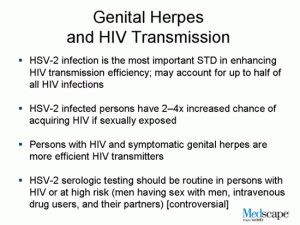“HSV-2 increases the risk of HIV acquisition, independent of recognized herpes lesions and behaviors.” – Dr. Cristina Renzi
During one particular study, having prior genital-herpes infection increased the risk of acquiring HIV by 80%.
This is important information since many individuals are not aware that a genital herpes infection can make it easier to become infected with HIV.
In fact, the CDC notes on its website that “Genital herpes can cause sores or breaks in the skin or mucous membranes (lining of the mouth, vagina, and rectum). The genital sores caused by herpes can bleed easily. When the sores come into contact with the mouth, vagina, or rectum during sex, they increase the risk of HIV transmission if either partner is HIV-infected.” (1)
During one particular study, having prior genital-herpes infection increased the risk of acquiring HIV by 80%. (2)
Conversely, those with HIV and genital herpes are more infectious than those with HIV alone. In a paper published in the journal PLoS One, researchers said “Clinical herpes was associated with higher levels of genital HIV shedding….” (3)
The authors of another study noted that their findings were “consistent with results from a study carried out in Bangui, Central African Republic, where …(the study found) a significant correlation between genital HIV RNA shedding and genital shedding of HSV.” (4)
They concluded that their study “adds to the accumulating evidence that HSV-2 infection increases genital shedding of HIV, and may therefore increase the infectivity of HIV….”
What does this mean?
In simple terms, the authors of these studies say that genital herpes increases the risk of contracting HIV. They also suggest that those with HIV and genital herpes shed the virus more, and infect others more easily.
The public should be aware of the relationship between genital herpes and HIV and should take precautions to prevent an HSV infection. Part of this entails consistent use of condoms, and others may include modifying sexual behavior.
References:
(1) CDC.gov – Genital Herpes – CDC Fact Sheet – Page last updated: July 1, 2014
(2) Cristina Renzi,1 John M. Douglas, Jr.,4 Mark Foster,4 Cathy W. Critchlow,2 Rhoda Ashley-Morrow,3
Susan P. Buchbinder,5 Beryl A. Koblin,6 David J. McKirnan,7 Kenneth H. Mayer,8,9 and Connie L. Celum1 “Herpes Simplex Virus Type 2 Infection as a Risk Factor for Human Immunodeficiency Virus
Acquisition in Men Who Have Sex with Men” – The Journal of Infectious Diseases – Published 13
December 2002.
(3) Jim Todd , Gabriele Riedner, Leonard Maboko, Michael Hoelscher, Helen A. Weiss, Eligius Lyamuya, David Mabey, Mary Rusizoka, Laurent Belec, Richard Hayes “Effect of Genital Herpes on Cervicovaginal HIV Shedding in Women Co-Infected with HIV AND HSV-2 in Tanzania” – PLoS One – Published: March 13, 2013
(4) François-Xavier Mbopi-Kéou1,2, Gérard Grésenguet3, Philippe Mayaud1, Helen A. Weiss1, Robin Gopal2, Mathieu Matta4, Jean-Louis Paul5, David W. G. Brown2, Richard J. Hayes1, David C. W. Mabey1 and Laurent Bélec4 “Interactions between Herpes Simplex Virus Type 2 and Human Immunodeficiency Virus Type 1 Infection in African Women: Opportunities for Intervention” The Journal of Infectious Diseases – J Infect Dis. (2000) 182 (4): 1090-1096.


